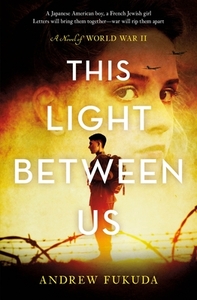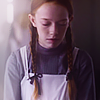Take a photo of a barcode or cover
As always, a heartbreaking WWII story. This one written partially in epistolary form, making the reader feel like they are a part of this tragic time in our history. A history not that long ago. I loved Charlie and adored Alex. I am always amazed and heart broken when I learn more about what people are capable of and are willing to do to other people because they are told to.
emotional
informative
sad
slow-paced
Plot or Character Driven:
Plot
Strong character development:
Yes
Loveable characters:
Yes
Diverse cast of characters:
Yes
Flaws of characters a main focus:
No
informative
sad
medium-paced
Strong character development:
Yes
Loveable characters:
Yes
Diverse cast of characters:
Yes
Flaws of characters a main focus:
Complicated
I truly became engrossed in this book which tells the platonic love story between a Japanese-American boy in Seattle and a young Jewish girl in Paris. They start as pen pals before the outset of WWII and immediately develop a strong bond. Alex, the Japanese-American boy, is then interned in a camp for Japanese-Americans after the Japanese attack Pearl Harbor, and along with his family is dehumanized in a shameful period of American history. Charles, the young Jewish girl in Paris, is persecuted along with her family by the Nazis. Their pen pal relationship flourishes through many years and eventually Alex decides to volunteer for a new all-Japanese-American battallion which will be allowed to fight in the war. His body, and spirit, are kept alive by the hope that he will find Charlie somewhere in Europe, alive.
The book is full of emotion and I found it vey compelling.
The book is full of emotion and I found it vey compelling.
I liked the idea behind this book but I struggled to connect with the characters the way they were written. The writing and content in the letters between Charlie and Alex didn’t feel accurate to their ages early in the book.
I also felt like the style of the book jumped all over in the second half of the book. Are we still reading a coming of age story? Is it magical realism? Is it an extremely graphic war novel?
The love story aspect of this book was lacking. It was an underlying presence throughout the whole book but never reached a climax. While likely accurate to actual life during WWII, it felt like an unsatisfying aspect of this novel.
All in all a great concept, but the execution wasn’t for me.
I also felt like the style of the book jumped all over in the second half of the book. Are we still reading a coming of age story? Is it magical realism? Is it an extremely graphic war novel?
The love story aspect of this book was lacking. It was an underlying presence throughout the whole book but never reached a climax. While likely accurate to actual life during WWII, it felt like an unsatisfying aspect of this novel.
All in all a great concept, but the execution wasn’t for me.
Andrew Fukuda's new book is heartbreaking and dark and reveals the horrors of war for European Jews and the injustices done to Japanese Americans. Charlie's story is one we have heard before. It is a terrible story of pain and genocide--one which we must continue to tell. Alex's story is not as commonly known. Most people would rather sweep the truths of racism and Japanese internment under the rug, but it is a painful truth that while Americans were off fighting the good war for truth and justice in Europe and the Pacific, many communities in this country were marginalized and stripped of their rights as citizens. Highly recommended for grades 8 and up.
Read more at Bookish Adventures.
Read more at Bookish Adventures.
Overall a good read. It takes a long tjme for the story to get exciting but its worth the time in my opinion. I loved the characters and the overall themes of the novel being family, friendship, and overcoming adversity.
I normally don’t like war stories but the war section of the book had me on my toes the whole time.
I normally don’t like war stories but the war section of the book had me on my toes the whole time.
Three very different stories.
Part One - Beginnings of a penpal coming-of-age relationship between a vivacious French girl and an awkward American boy.
Part Two - A family trauma in a Japanese-American internment camp.
Part Three - A bullet-flying comrade-driven WW2 experience
Part Four - I’ll leave that to be discovered.
Wished for more historical notes at the end and stronger thread between the stories.
Part One - Beginnings of a penpal coming-of-age relationship between a vivacious French girl and an awkward American boy.
Part Two - A family trauma in a Japanese-American internment camp.
Part Three - A bullet-flying comrade-driven WW2 experience
Part Four - I’ll leave that to be discovered.
Wished for more historical notes at the end and stronger thread between the stories.
I don't particularly gravitate towards World War (I or II) stories, but ever since Allegiance on broadway, I've been wanting to read more about the history of Japanese internment camps during World War II, so the synopsis intrigued me.
There wasn't necessarily anything I didn't like about the book, save a few minor details her and there, it just didn't pull me in the way I wanted it to, which I think is at least partly because the storyline jumped continents halfway through the story, with the storyline in America skipping any kind of denouement. I thought the author balanced the similarities and differences of being Japanese in America, and being Jewish in France at this time decently well, and the parallels between Alex and Charlie's lives were some of my favourite notes of the story.
I think I might have liked this to have been two different novels: one telling the history of Manzanar, and another telling the history of the 442nd regiment. It taught me some things I did not know, and I wholeheartedly appreciate the resources given at the end of the book to inquire further.
There wasn't necessarily anything I didn't like about the book, save a few minor details her and there, it just didn't pull me in the way I wanted it to, which I think is at least partly because the storyline jumped continents halfway through the story, with the storyline in America skipping any kind of denouement. I thought the author balanced the similarities and differences of being Japanese in America, and being Jewish in France at this time decently well, and the parallels between Alex and Charlie's lives were some of my favourite notes of the story.
I think I might have liked this to have been two different novels: one telling the history of Manzanar, and another telling the history of the 442nd regiment. It taught me some things I did not know, and I wholeheartedly appreciate the resources given at the end of the book to inquire further.







